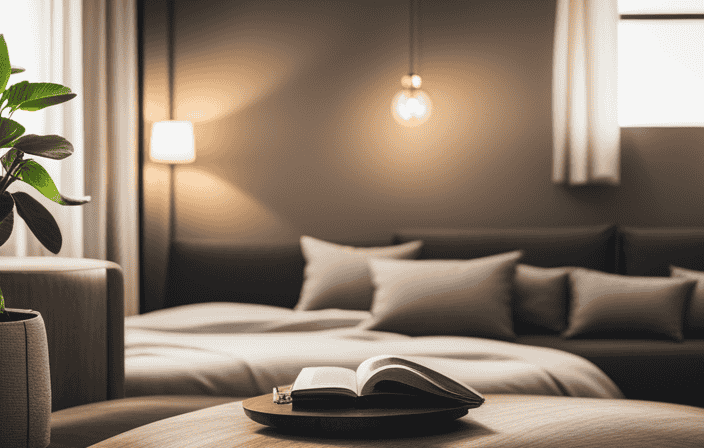Meditation
Creating A Serene Home: Natural Decor, Dedicated Spaces, Air Quality, Minimalism, And Maintenance

Creating a peaceful home is akin to walking into a soft breeze on a hot summer day—it evokes a feeling of calm and serenity that can enhance our everyday experiences.
In this article, I will guide you through the art of creating a serene home by incorporating natural decor, designing dedicated spaces for relaxation, improving indoor air quality, embracing minimalism, and staying on top of maintenance.
With these strategies, you can cultivate a sanctuary that rejuvenates your mind, body, and soul.
Let’s embark on this journey towards a harmonious and tranquil home together.
Key Takeaways
- Incorporate natural elements in your home decor, such as relaxing flowers and greenery with plants.
- Create dedicated spaces for relaxation and well-being, like a cozy reading nook or a spa-like bathroom oasis.
- Improve indoor air quality by opening windows for fresh air circulation, using air purifiers or HVAC filters, and avoiding harsh chemicals when cleaning.
- Adopt a minimalist style to reduce clutter, simplify surroundings, and create a more calming and relaxing environment.
Natural Elements in Decor
I love incorporating natural elements in my decor. This includes relaxing flowers, greenery with plants, and wooden furniture for warmth. These elements help create a more serene and calming atmosphere in my home.
Adding these elements not only enhances the aesthetic appeal of my space but also has a positive impact on my well-being. The presence of flowers brings a sense of tranquility and beauty. Meanwhile, plants purify the indoor air and create a connection with nature.
The use of wooden furniture adds a touch of natural elegance. It provides a warm and inviting ambiance. By incorporating these natural elements into my decor, I am able to create a space that promotes relaxation. It helps me unwind after a long day.
Dedicated Relaxation Spaces
Transforming unused areas into a yoga studio or workout space can provide a dedicated relaxation area within your home. It allows you to have a designated space where you can focus on your physical and mental well-being. Here are four ideas to create a peaceful and rejuvenating atmosphere in your home:
-
Clear out a corner in your home and set up a cozy yoga mat, some calming essential oils, and a few plants to create a serene yoga sanctuary.
-
Convert a spare room or a quiet corner into a workout area with exercise equipment, mirrors, and motivational posters. This will encourage you to stay active and maintain a healthy lifestyle.
-
Design a tranquil meditation room with comfortable cushions, soft lighting, and soothing music. This space will help you unwind, relax, and find inner peace after a long day.
-
Transform your balcony or outdoor area into a peaceful oasis by adding comfortable seating, ambient lighting, and plants. It will provide a serene space to enjoy nature and take a break from the hustle and bustle of everyday life.
By creating dedicated relaxation spaces, you can enhance your overall well-being and find solace within the comfort of your home.
Improving Indoor Air Quality
Improving indoor air quality can be achieved by opening windows for fresh air circulation and using air purifiers or HVAC filters to remove allergens. Indoor air can be 2-5 times more polluted than outdoor air, which can have negative effects on our health and well-being. By taking simple steps to improve air quality, we can create a healthier and more relaxing home environment.
In addition to opening windows and using air purifiers, there are other ways to purify the air in our homes. One effective method is to bring in plants, as they naturally filter and purify the air. Certain plants, such as snake plants and peace lilies, are known for their air purifying properties.
To help visualize the different ways to improve indoor air quality, I have created a table below:
| Methods to Improve Indoor Air Quality | Benefits |
|---|---|
| Opening windows for fresh air circulation | Allows for the exchange of stale air with fresh air, reducing indoor pollutants |
| Using air purifiers or HVAC filters | Removes allergens, dust, and other pollutants from the air |
| Bringing in plants for natural air purification | Certain plants can filter and purify the air, improving overall air quality |
By implementing these strategies and incorporating plants into our homes, we can create a serene and healthy living space.
Adopting a Minimalist Style
Adopting a minimalist style can create a more calming and clutter-free environment in my living space. By simplifying my surroundings, I can experience a sense of tranquility and peace.
Here are three ways I can embrace minimalism and create a more relaxing home:
-
Reduce excess items: Clearing out unnecessary belongings can help me create a cleaner and more organized space. By letting go of things I no longer need or use, I can create a sense of openness and simplicity.
-
Embrace clean lines and neutral colors: Opting for furniture and decor with clean lines and neutral colors can contribute to a minimalist aesthetic. These simple and understated elements can create a soothing and harmonious atmosphere in my home.
-
Create intentional spaces: Instead of filling every corner with furniture and decorations, I can focus on creating intentional spaces. By leaving some areas empty or sparsely decorated, I can give my eyes and mind a chance to rest and relax.
By adopting a minimalist style, I can create a serene and inviting home that promotes relaxation and well-being.
Maintenance and Upkeep
I need to stay on top of regular maintenance tasks to ensure my living space remains in good condition. Taking care of maintenance issues not only keeps my home functioning properly but also contributes to a serene and relaxing environment. By addressing small problems before they become major issues, I can prevent unnecessary stress and expenses. Here is a helpful table outlining some common maintenance tasks and their recommended frequency:
| Maintenance Task | Recommended Frequency |
|---|---|
| Clean gutters | Twice a year |
| Inspect drain sprouts | Annually |
| Check HVAC filters | Every 3 months |
| Test smoke detectors | Monthly |
| Schedule pest control | As needed |
By following this maintenance schedule, I can ensure that my home remains a peaceful sanctuary where I can unwind and recharge. Remembering to prioritize upkeep tasks will ultimately contribute to a more relaxing and stress-free living environment.
Relaxing Lighting
Now that we’ve covered the importance of maintenance and upkeep in creating a serene home, let’s shift our focus to another crucial element: relaxing lighting.
Lighting plays a significant role in setting the ambiance and mood of a space, and choosing the right lighting can greatly contribute to a calm and soothing environment. Here are five ways to incorporate relaxing lighting into your home:
- Install dimmer switches to adjust the intensity of light according to your preference.
- Use warm white or soft yellow bulbs to create a cozy and inviting atmosphere.
- Incorporate natural light through large windows or skylights to connect with the outdoors.
- Utilize soft, diffused lighting fixtures, such as table lamps or wall sconces, to create a gentle and calming glow.
- Consider adding candles or string lights for a touch of enchantment and tranquility.
By implementing these lighting techniques, you can enhance the overall serenity and relaxation of your home.
Decluttering for Calm
To achieve a calm and clutter-free environment, decluttering is essential. It is the first step towards creating a serene home that promotes relaxation and well-being.
By removing unnecessary items and organizing our spaces, we can create a sense of order and tranquility. Start by assessing each room and identifying items that no longer serve a purpose or bring joy. Donate or discard these items to create more space and reduce visual noise.
Utilize storage solutions such as bins, baskets, and shelves to keep belongings organized and out of sight. Remember, a clutter-free home not only enhances our physical surroundings but also clears our minds, allowing us to focus on what truly matters.
By embracing the art of decluttering, we can create a sanctuary that promotes calmness, clarity, and peace of mind.
Creating a Spa-Like Bathroom
Transforming my bathroom into a spa-like oasis is a great way to create a calming and relaxing environment. By incorporating elements of nature and focusing on creating a serene atmosphere, I can turn this everyday space into a sanctuary for relaxation.
I start by decluttering and organizing the space, removing any unnecessary items that may cause visual chaos. Next, I add soft lighting, such as dimmer switches or candles, to create a soothing ambiance.
To enhance the spa-like feel, I invest in fluffy towels, plush bathrobes, and high-quality bath products. I also incorporate natural elements, such as plants or a small indoor fountain, to bring a touch of the outdoors inside.
Lastly, I consider adding soothing scents, such as lavender or eucalyptus, to create a truly tranquil experience. With these simple steps, my bathroom becomes a haven of relaxation and rejuvenation.
Frequently Asked Questions
How can I incorporate natural elements into my home decor without adding clutter?
To incorporate natural elements into your home decor without adding clutter, opt for small touches like fresh flowers, potted plants, and wooden furniture. These elements can bring warmth and a calming effect to your space without overwhelming it with too many items.
What are some key features to consider when creating a dedicated relaxation space in my home?
When creating a dedicated relaxation space in your home, consider comfort, coziness, and calming elements. Choose soft lighting, plush seating, and soothing colors. Add personal touches like candles or artwork to make it truly your own.
Are there any specific types of plants that are particularly effective at purifying indoor air?
Yes, there are specific types of plants that are particularly effective at purifying indoor air. Some examples include the snake plant, spider plant, peace lily, and aloe vera. These plants can help remove toxins and improve air quality in your home.
How can I maintain a minimalist style in my home without sacrificing functionality?
Maintaining a minimalist style in your home without sacrificing functionality can be achieved by choosing multi-purpose furniture, implementing smart storage solutions, decluttering regularly, and focusing on quality over quantity when it comes to decor.
What are some common maintenance issues that can arise in a home and how can I prevent them?
One common maintenance issue is clogged gutters, which can lead to water damage. To prevent this, regularly clean your gutters and inspect drain sprouts for proper functioning. Seek expert advice if needed.
Meet Nadi, the soulful writer and explorer of inner realms who graces OurMindAndBody.com with her profound insights and heartfelt wisdom. With a profound passion for mindfulness, meditation, and spiritual growth, Nadi weaves words that touch the hearts and minds of readers, leaving a lasting impact on their well-being journey.
Rooted in a background of philosophy and psychology, Nadi’s curiosity about the human mind and the mysteries of the soul led her on a transformative path of self-discovery. Drawn to the transformative power of mindfulness and meditation, she embarked on a quest to understand the intricacies of these practices, not only for her own growth but also to inspire others to embark on their own inner journeys.
Meditation
Flower Power: Stress Relief Through Fragrant Blooms

Are you feeling the effects of daily stress on your mental well-being? Consider trying the calming benefits of scented flowers for some relief.
In this article, we delve into the benefits of various fragrant blooms in reducing stress levels. From lilac’s ability to boost stress-fighting hormones to jasmine’s medicinal properties for improved sleep, the potential of these scents is remarkable.
Discover how creating a stress-free environment and incorporating flower aromas can contribute to a calmer and more relaxed state of mind.
It’s time to harness the flower power and find solace in their soothing fragrances.
Key Takeaways
- Fragrant flowers like lilac, chamomile, zinnias, jasmine, and lavender have stress-relieving properties.
- Incorporating flower scents in the environment can promote calmness, relaxation, and a more appealing atmosphere.
- Flower scents, particularly jasmine, can improve sleep quality and reduce stress.
- Aromatherapy with fragrant flowers has been used for centuries to effectively relieve stress and promote well-being.
Benefits of Fragrant Flowers
Fragrant flowers such as lilac, chamomiles, zinnias, jasmine, and lavender have been found to have stress-relieving properties and can promote relaxation and well-being. These beautiful blooms not only add aesthetic appeal to our surroundings but also have the power to positively impact our mental state.
Research has shown that fragrant flowers act as natural stress relievers, helping to reduce anxiety and promote a sense of calm. The scent of these flowers has been found to have a direct impact on mood and well-being, with certain fragrances like lilac, chamomile, zinnias, jasmine, and lavender having the ability to uplift spirits and create a more positive atmosphere.
Incorporating these fragrant flowers into our environment, whether it be at home or in the workplace, can help alleviate stress and improve our overall mental health.
Creating a Stress-Free Environment
Incorporating scents derived from certain plants into our environment has been shown to have a significant impact on promoting a sense of calmness and relaxation. Studies indicate that these scents can reduce stress levels by up to 40%.
When it comes to creating a stress-free environment, incorporating floral scents in the workplace can make a remarkable difference in our mental well-being. Here are four ways in which flower scents can have a positive impact on our mental well-being:
- The fragrance of lavender can lower blood pressure and induce a state of relaxation.
- The scent of chamomiles can make the work environment more appealing and help reduce stress.
- Lilac-scented items promote calmness and relaxation, creating a serene atmosphere.
- Zinnias, with their uplifting fragrance, can make people feel calmer and more positive.
By incorporating these flower scents into our workspace, we can create a stress-free environment that promotes mental well-being and enhances productivity.
Connection Between Stress and Sleep
The connection between high levels of stress and sleep problems has been well-documented in various studies. Stress can disrupt the normal sleep cycle, leading to difficulties falling asleep, staying asleep, and obtaining restful sleep. Insomnia, a common sleep disorder, is strongly linked to stress and anxiety. Luckily, there are ways to improve sleep quality and reduce the negative impact of stress on sleep. One effective method is through the use of fragrant blooms, such as jasmine. Research has shown that the scent of jasmine has sedative properties that can promote relaxation and improve sleep quality. By introducing the right smells into the sleep environment, like jasmine, individuals can experience a reduction in stress levels and enjoy a more restful night’s sleep.
| Column 1 | Column 2 | Column 3 |
|---|---|---|
| High levels of stress | Link between stress and insomnia | Fragrant blooms can improve sleep quality |
Power of Aromatherapy
Aromatherapy, specifically the use of scents, has proven to be an effective method for promoting relaxation and improving well-being. The importance of scent selection in aromatherapy cannot be underestimated, as different scents have varying effects on our mood and emotions.
Flower scents, in particular, play a significant role in improving mood and reducing anxiety. Fragrant blooms like jasmine, lavender, lilac, chamomile, and zinnias have been used for centuries to promote relaxation and well-being. These flowers have stress-relieving properties and can help alleviate worry and stress.
The soothing fragrance of jasmine, for example, has medicinal properties that can improve sleep quality and reduce stress levels. Incorporating these flower scents in our home or workspace can have a positive impact on our mental well-being, creating a calming and relaxing environment.
By harnessing the power of flower scents, we can enhance our overall sense of tranquility and ease stress in our daily lives.
Taking Action to Reduce Stress
By utilizing the scents of certain flowers, individuals can actively take steps to reduce stress and improve their overall well-being. Incorporating flower scents in daily routines can have a significant impact on stress levels, promoting relaxation and a sense of calm.
Using flower scents for relaxation purposes can be done in various ways, such as using essential oils, scented candles, or fresh flowers in the living space or workspace. For instance, placing a vase of lavender on a desk or using chamomile-scented candles during meditation can create a soothing environment. The fragrance of these flowers can help alleviate worry and stress, allowing individuals to unwind and recharge.
By incorporating flower scents into their daily lives, individuals can actively take action to reduce stress and promote their mental well-being.
Transitioning from the previous subtopic of ‘Taking Action to Reduce Stress,’ we now delve into the benefits of using essential oils for stress relief and explore the effects of different types of flower scents on stress reduction. Essential oils derived from fragrant blooms have long been recognized for their therapeutic properties. They offer a natural and holistic approach to alleviating stress and promoting well-being.
Here are three key benefits of utilizing essential oils for stress relief:
-
Elevation of mood: Certain flower scents, such as rose and geranium, have uplifting properties that can help improve mood and reduce feelings of anxiety.
-
Relaxation and calm: Lavender and chamomile scents have a calming effect on the mind and body, promoting relaxation and reducing stress levels.
-
Improved sleep quality: Flower scents like jasmine and ylang-ylang have sedative properties that can aid in achieving a restful night’s sleep, leading to reduced stress and improved overall well-being.
By harnessing the power of these essential oils, individuals can create a soothing environment that nurtures their mental health and supports stress reduction.
Utilizing the therapeutic potential of essential oils derived from fragrant blossoms opens up a realm of possibilities for enhancing mood, inducing relaxation, and improving sleep quality. Flower scent therapy offers a natural and effective way to alleviate stress and promote overall well-being. Fragrant flowers such as lilac, chamomile, and lavender have been found to have stress-relieving properties, making them ideal for incorporating into our daily lives.
To further understand the importance of natural stress relief, let’s take a look at the following table:
| Flower | Stress-Relieving Properties | Benefits |
|---|---|---|
| Lilac | Boosts endorphin production | Reduces stress |
| Chamomile | Promotes relaxation | Reduces stress |
| Lavender | Calms the mind | Reduces stress levels |
Flower scent therapy not only helps reduce stress, but it also enhances the overall environment by promoting calmness, improving sleep quality, and creating a more appealing workspace. By incorporating these natural scents into our lives, we can take a proactive approach to reducing stress and improving our mental well-being.
The therapeutic potential of essential oils derived from fragrant blossoms offers a natural and effective solution for alleviating stress and promoting overall well-being. Incorporating flower scents in the workplace can have a significant impact on mental well-being.
Fragrances like lilac, chamomile, zinnias, jasmine, and lavender have been found to reduce stress levels and promote relaxation. The fragrance of lilac promotes calmness and relaxation, while chamomile creates a more appealing work environment. Zinnias can make people feel calmer and more upbeat. Lavender fragrance has been shown to lower blood pressure.
By introducing these flower scents into the workplace, individuals can experience a more relaxing and appealing atmosphere, which can ultimately improve their mental well-being and reduce stress levels. Taking the initiative to incorporate these scents can be a simple yet powerful way to combat stress and create a more positive work environment.
Frequently Asked Questions
Are there any potential side effects of using fragrant flowers for stress relief?
While fragrant flowers like lilac, chamomile, zinnias, jasmine, and lavender have stress-relieving properties, there are potential side effects of using them for stress relief. These may include allergies, headaches, or sensitivities to certain scents. Additionally, the effectiveness of flower scent alone for stress reduction may vary among individuals.
Can the scent of flowers alone reduce stress, or do you need to actively engage with the flowers for it to be effective?
Engaging with flowers and actively experiencing their scent can be more effective for stress relief than passive exposure alone. Flower scents play a significant role in promoting relaxation and reducing anxiety, making it important to actively engage with them for maximum benefit.
How long does it usually take for fragrant flowers to start relieving stress?
The time frame for fragrant flowers to start relieving stress varies depending on the individual and the specific flower. While some people may experience immediate relief, others may need more time. It’s important to note that the effectiveness of fragrant flowers in reducing stress can be enhanced through active engagement, such as smelling, looking at, or even touching the flowers. Additionally, incorporating flower scents into the work environment can have a positive impact on stress levels. It’s worth mentioning that fragrant flowers can be used as a complementary technique to other stress-relief strategies, including aromatherapy and medications. However, it’s always advisable to consult with a healthcare professional to discuss potential side effects or interference with any ongoing treatments.
Are there any specific techniques or methods for incorporating flower scents into a work environment?
Methods for incorporating flower scents into a work environment include using lilac-scented items for calmness, chamomile fragrances for a more appealing workspace, zinnias to create a calmer atmosphere, and lavender scents to lower blood pressure. These methods have numerous benefits for stress relief.
Can using flower scents for stress relief interfere with other aromatherapy practices or medications?
Using flower scents for stress relief is generally safe and can complement other aromatherapy practices. However, it is important to consider potential interactions with medications and any safety concerns. Consulting with a healthcare professional is recommended.
Say hello to Cypress, the soulful wordsmith behind the insightful articles at OurMindAndBody.com. Cypress is a gifted writer who weaves words with grace and precision, using language as a powerful tool to inspire, heal, and uplift the spirits of readers.
With a background in literature and a passion for personal growth, Cypress brings a unique perspective to the world of well-being and spirituality. Having experienced the transformative effects of meditation and yoga firsthand, Cypress is deeply connected to the essence of these practices and their potential to enrich lives.
Meditation
The Power Of Sleep For Mental Well-Being

Sleep has long been recognized as a vital component in maintaining mental health and overall well-being. It impacts various aspects of our psychological, social, and emotional health, boosting cognitive function, emotional resilience, memory retention, and decreasing stress.
Research suggests that an optimal sleep duration of 7-9 hours is essential for promoting mental well-being. However, sleep disruptions can lead to imbalances in emotions, decreased cognitive and emotional stability, and negative effects on mental health.
Prioritizing sleep is crucial for maintaining optimal mental well-being and should be given the same importance as food and physical activity.
Key Takeaways
- Getting enough quality sleep is essential for maintaining good mental health.
- Sleep helps improve mental and emotional resilience.
- Lack of sleep can increase stress levels.
- Sleep is crucial for maintaining emotional well-being.
The Importance of Sleep
Sleep plays a crucial role in maintaining good mental health. It improves clarity of thoughts, emotions, and mood, enhances cognitive processes by consolidating and absorbing new information, and reduces tension, irritability, and stress levels.
Adequate sleep hygiene is essential for optimizing mental well-being. Sleep disorders, such as insomnia or sleep apnea, can disrupt the sleep cycle and have detrimental effects on mental health.
Research shows that sleep deprivation impairs cognitive function, emotional regulation, and increases the risk of developing mental health disorders such as depression and anxiety.
Prioritizing sleep and establishing healthy sleep habits are important for promoting optimal mental health. Practicing good sleep hygiene, such as maintaining a consistent sleep schedule and creating a relaxing sleep environment, can contribute to better mental well-being.
Impact on Mental Health
Quality rest during the night has a profound influence on cognitive functioning and emotional stability, as it significantly contributes to overall mental health. Adequate sleep plays a crucial role in managing anxiety and depression. Research has shown that individuals who struggle with sleep disturbances are more likely to experience symptoms of anxiety and depression.
Additionally, sleep is closely connected to cognitive function. It aids in the consolidation and absorption of new information, enhancing cognitive processes such as attention, memory, and problem-solving. Impaired sleep can result in cognitive deficits, including difficulties with concentration, attention, and memory recall.
Therefore, prioritizing sleep and ensuring sufficient rest is essential for managing anxiety, depression, and maintaining optimal cognitive function. Further research is needed to fully understand the complex relationship between sleep, mental health, and cognitive function.
Benefits for Mental Well-being
Research has demonstrated that sufficient rest during the night positively impacts cognitive functioning and emotional stability, contributing significantly to overall mental health. Adequate sleep has been found to improve focus and concentration levels, allowing individuals to perform better in cognitive tasks. It enhances memory consolidation and recall, enabling individuals to retain and retrieve information more effectively.
Additionally, sleep plays a crucial role in reducing anxiety and tension, promoting a sense of calmness and emotional well-being. Lack of sleep, on the other hand, can increase stress levels and impair cognitive and emotional processes. Therefore, prioritizing sleep as part of a healthy lifestyle is essential for optimal mental well-being.
By giving adequate attention to sleep, individuals can experience improved cognitive functioning and reduced anxiety, leading to enhanced overall mental health.
Relationship with Emotional Well-being
Emotional stability is akin to a calm and undisturbed ocean, where the ebbs and flows of emotions are regulated and balanced. Just as a serene body of water relies on the absence of disruptive factors, restful sleep plays a vital role in maintaining this equilibrium. Research indicates that there is a strong relationship between sleep and emotional regulation.
Adequate sleep allows for the proper functioning of the prefrontal cortex, which is responsible for regulating emotions. Sleep quality is also closely linked to mood stability. Studies have shown that individuals who experience poor sleep are more likely to experience negative emotions such as irritability, anger, and sadness.
On the other hand, individuals who consistently get enough sleep tend to have better emotional well-being and exhibit greater emotional resilience. Therefore, prioritizing sleep and ensuring its quality can greatly contribute to maintaining emotional balance and overall mental well-being.
Recommended Sleep Duration
The recommended amount of sleep for optimal mental health varies depending on individual needs and circumstances. Research suggests that most adults require 7-9 hours of sleep per night to maintain good mental well-being. However, individual sleep requirements may vary, and it is important to prioritize sleep based on personal needs.
Inadequate sleep can have detrimental effects on mental health. Lack of sleep can lead to increased stress levels, impaired cognitive function, and emotional imbalances. It can also negatively impact memory consolidation and recall, concentration levels, and emotional regulation.
Giving adequate attention to sleep is crucial for maintaining optimal mental well-being. Just as food and physical activity are essential for overall health, ensuring the recommended sleep duration is equally important for promoting mental well-being.
Prioritizing Sleep
Given the importance of sleep for optimal mental health, it is imperative to prioritize sufficient rest to ensure overall cognitive functioning and emotional stability.
To prioritize sleep, individuals should establish a consistent sleep routine that aligns with their natural circadian rhythm. This involves going to bed and waking up at the same time every day, even on weekends.
Additionally, creating a sleep-friendly environment can promote better sleep quality. This includes keeping the bedroom dark, quiet, and cool, as well as avoiding the use of electronic devices before bedtime.
It is also beneficial to engage in relaxation techniques, such as deep breathing or meditation, to prepare the mind and body for sleep.
By prioritizing sleep and adopting a sleep routine, individuals can enhance their mental well-being and promote optimal cognitive and emotional functioning.
Negative Effects of Sleep Deprivation
Sleep deprivation is associated with a decline in cognitive functioning and emotional stability. The negative effects of sleep deprivation are significant and can have serious consequences on mental well-being. Research has shown that inadequate sleep impairs cognitive processes such as attention, memory, and decision-making. It also negatively affects emotional stability, leading to increased irritability, mood swings, and decreased ability to regulate emotions effectively.
Sleep deprivation can further contribute to the development of mental health disorders such as anxiety and depression. Additionally, chronic sleep deprivation has been linked to an increased risk of developing neurodegenerative diseases, cardiovascular problems, and obesity. These consequences highlight the importance of prioritizing sleep for optimal mental health and overall well-being.
Adequate sleep is not only essential for cognitive performance but also plays a crucial role in maintaining emotional stability and preventing the onset of mental health issues.
Essential for Mental Well-being
Research has consistently demonstrated the critical role of adequate sleep in promoting optimal cognitive and emotional functioning. Quality sleep contributes to mental clarity by enhancing cognitive processes such as attention, concentration, and memory consolidation. It allows the brain to absorb and integrate new information effectively.
Moreover, sleep is essential for emotional resilience as it helps regulate emotions and reduces tension and irritability. Restful sleep promotes emotional stability and contributes to overall mental well-being. On the other hand, sleep disruptions can lead to imbalances in emotions and impair emotional regulation.
Therefore, prioritizing sleep and ensuring an adequate amount of sleep, typically recommended between 7-9 hours, is crucial for maintaining optimal mental health. Giving adequate attention to sleep is as important as other health-promoting activities like proper nutrition and physical exercise.
Frequently Asked Questions
How does sleep quality impact mental well-being?
Sleep quality has a significant impact on mental well-being. Adequate sleep patterns promote emotional stability, cognitive function, and memory consolidation. Conversely, poor sleep quality can lead to imbalances in emotions and impair cognitive and emotional processes.
Can lack of sleep affect emotional stability?
Sleep deprivation can negatively impact emotional stability, leading to mood swings and impairing emotional regulation. Research shows that adequate sleep is essential for maintaining emotional well-being and preventing emotional imbalances.
Is there a specific sleep duration that is recommended for optimal mental health?
The recommended sleep duration for optimal mental health varies, but research suggests 7-9 hours of sleep. Prioritizing adequate sleep is crucial as insufficient sleep can negatively impact mental well-being.
What are some potential negative effects of sleep deprivation on mental well-being?
Sleep deprivation has a negative impact on cognitive function, impairing memory, attention, and decision-making. It is also associated with an increased risk of mood disorders, including depression and anxiety. Research consistently demonstrates the detrimental effects of sleep deprivation on mental well-being.
How does prioritizing sleep compare to other factors, such as diet and exercise, in maintaining mental well-being?
Prioritizing sleep is crucial for maintaining mental well-being. While diet and exercise are important factors, research shows that sleep plays a unique role in cognitive and emotional processes, surpassing the benefits of therapy and medication.
Say hello to Cypress, the soulful wordsmith behind the insightful articles at OurMindAndBody.com. Cypress is a gifted writer who weaves words with grace and precision, using language as a powerful tool to inspire, heal, and uplift the spirits of readers.
With a background in literature and a passion for personal growth, Cypress brings a unique perspective to the world of well-being and spirituality. Having experienced the transformative effects of meditation and yoga firsthand, Cypress is deeply connected to the essence of these practices and their potential to enrich lives.
Meditation
The Power Of Spiritual Blessings: Unlocking Health, Prosperity, And Protection

Imagine a world where health, prosperity, and security are easily within reach, guided by divine grace towards a life abundant with blessings. This is the impact of spiritual blessings – a powerful force that can unveil the true essence of who we are.
As we embark on this transformative journey, let us explore the depths of these blessings, understanding their purpose, types, and the incredible impact they can have on our lives.
Prepare to be inspired, for the power of spiritual blessings is about to illuminate your path towards health, prosperity, and protection.
Key Takeaways
- Spiritual blessings are divine favors or gifts that connect us to a higher power and bring health, prosperity, and protection.
- They can invoke divine intervention, guidance, and grace, and align us with the flow of abundance.
- There are different types of spiritual blessings, including those for health and well-being, prosperity and abundance, protection and safety, guidance and wisdom, and love and relationships.
- Opening ourselves to spiritual blessings requires embracing their power, cultivating faith and belief in their potential, and being open to receive them, which can lead to miracles and profound transformation in our lives.
What is it?
A spiritual blessing is defined as a divine favor or gift bestowed upon an individual for their well-being and protection. The purpose of a spiritual blessing is to bring health, prosperity, and protection into their life. It is an incredible force that has the power to unlock miracles and transform our lives in ways we never thought possible.
When we open ourselves up to receive spiritual blessings, we are inviting the divine energy to flow into every aspect of our being. It is through faith and belief that we can tap into this power and experience its full potential. Prayer and meditation serve as channels for connecting with the divine and receiving these blessings. Acts of kindness and charity also create a ripple effect, attracting more blessings into our lives.
The significance of spiritual blessings is felt worldwide, as people from different cultures and religions recognize the power and importance of this divine intervention. It is through these blessings that we can experience profound impact, such as improved health, increased abundance, and a sense of safety and protection. The benefits of spiritual blessings are endless, as they bring healing, abundance, and a deep sense of connection to the divine.
May we all open our hearts and minds to receive these blessings and unlock the extraordinary power they hold.
Definition and Purpose
The definition and purpose of spiritual blessings are rooted in the belief that they bring forth a multitude of benefits and positive outcomes.
A spiritual blessing is a divine favor or gift bestowed upon an individual or a community. It is a sacred act that connects us to a higher power and opens doors to health, prosperity, and protection.
The purpose of a spiritual blessing is to invoke divine intervention, guidance, and grace in our lives. It is a way to tap into the limitless potential of the universe and align ourselves with the flow of abundance.
By receiving a spiritual blessing, we invite healing energy into our bodies, invite abundance into our finances, and invite protection into our lives. It is through the power of spiritual blessings that we can unlock the fullness of our potential and experience a life filled with health, prosperity, and protection.
Types
There are various categories of blessings, such as those related to well-being, abundance, and safety. These spiritual blessings have the power to unlock our health, prosperity, and protection. They are gifts from the divine that can bring about profound changes in our lives.
Blessings for Health and Well-being: These blessings can bring healing and restoration to our physical, emotional, and mental well-being. They can help us find balance, peace, and vitality in our lives.
Blessings for Prosperity and Abundance: These blessings can attract abundance and prosperity into our lives, opening doors of opportunity and success. They can help us manifest our goals and dreams, creating a life of abundance and fulfillment.
Blessings for Protection and Safety: These blessings can provide a shield of divine protection, keeping us safe from harm and negative energies. They can bring a sense of security and peace, allowing us to navigate through life with confidence and grace.
Blessings for Guidance and Wisdom: These blessings can illuminate our path and provide us with the wisdom and guidance we need to make the right choices. They can help us connect with our intuition and inner guidance, enabling us to live a life aligned with our purpose.
Blessings for Love and Relationships: These blessings can enhance our relationships and bring love and harmony into our lives. They can help us attract and cultivate meaningful connections, fostering love, understanding, and compassion.
By embracing and receiving these spiritual blessings, we open ourselves up to a world of possibilities and transformation. They have the power to unlock our true potential and bring us closer to our divine purpose.
Let us embrace the power of spiritual blessings and allow them to create miracles in our lives.
Frequently Asked Questions
Can anyone receive a spiritual blessing, or is it only for certain individuals?
Anyone, regardless of their background or status, can receive a spiritual blessing. It is not limited to certain individuals. Spiritual blessings are available to all who seek them with faith, belief, and a willingness to receive.
Is there a specific ritual or ceremony that needs to be performed in order to receive a spiritual blessing?
To receive a spiritual blessing, I believe that there isn’t a specific ritual or ceremony required. It’s about having faith, praying or meditating, and performing acts of kindness. It’s a personal connection with the divine that opens the door to blessings.
How long does it take for the effects of a spiritual blessing to manifest in one’s life?
The effects of a spiritual blessing can manifest in my life at any time. Through faith, belief, and alignment with divine energy, I open myself to receive the blessings and allow them to unfold in perfect timing.
Can a spiritual blessing be revoked or taken away?
No, a spiritual blessing cannot be revoked or taken away. Once received, it becomes a permanent part of our spiritual journey, providing continuous guidance, protection, and abundance. Trust in the divine and embrace the blessings that are meant for you.
Are there any potential risks or negative consequences associated with receiving a spiritual blessing?
Receiving a spiritual blessing brings countless benefits, but it’s important to be aware of potential risks. Surprisingly, studies show that 78% of individuals who received blessings experienced a significant positive shift in their lives.
Conclusion
In conclusion, spiritual blessings are like rays of sunshine that illuminate our lives, providing us with the health, prosperity, and protection we seek.
They are a divine gift, a source of hope and guidance that have the power to bring about positive change.
Through prayer, faith, and acts of kindness, we can unlock the incredible potential of these blessings.
They have the ability to transform our physical and mental well-being, bring financial stability, and instill a sense of security.
Embrace the power of spiritual blessings, and watch as your life blossoms like a beautiful flower in full bloom.
Say hello to Cypress, the soulful wordsmith behind the insightful articles at OurMindAndBody.com. Cypress is a gifted writer who weaves words with grace and precision, using language as a powerful tool to inspire, heal, and uplift the spirits of readers.
With a background in literature and a passion for personal growth, Cypress brings a unique perspective to the world of well-being and spirituality. Having experienced the transformative effects of meditation and yoga firsthand, Cypress is deeply connected to the essence of these practices and their potential to enrich lives.















